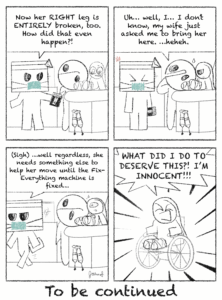Starting from my first introductory biology class and continuing through my four years of a microbiology major, almost every professor I had stressed time and time again that they were more interested in us learning concepts and ways of thinking that we could apply to facts, rather than simply memorizing facts and spitting them back on a test.
Now, in my fifth year, for my Take Five in Russian Studies, I’ve encountered a different kind of course — Russian 101. Within just a few days, practically before we had even learned the alphabet, we had learned one of our first Russian sayings. (Russians love sayings.) “Повтарение — мать учения,” (“Pof-ta-RAIN-ya — mat oo-CHAIN-ya”) meaning, “Memorization is the mother of learning.” My days of forgetting nitpicky details in favor of appreciating the big picture were over. Russian has many nits to pick.
So after years of trying to understand processes and pathways rather than how to spell esoteric names of genes and proteins, I not only had to start learning a new alphabet and a myriad of new words, but I had to relearn how to memorize.
As a board-certified nerd, I had always been fairly decent at memorization (although mostly of irrelevant facts rather than what I was actually supposed to learn. Did you know the “S” in President Harry S Truman’s middle name doesn’t stand for anything? His full middle name is just S). But I was fairly out of practice, so I had to come up with some creative ways of memorizing some of the more difficult words.
One of the methods I use for a word I’m really struggling with is to come up with a mental image or a story that’s easier to remember, rather than just rote memorization of words or concepts alone. These mnemonics are especially effective if they’re funny, so I try to make them funny whenever possible. Sometimes, they’re funny enough that I want to share them, and fortunately for me I have an outlet where I can publish whatever I think is funny, and maybe help my fellow Russian classmates study along the way.
So, without further ado, I am proud to present some samples from my favorite mnemonic knee-slappers:
Коричневый
(kuh-REECH-nee-voy, meaning “brown”)
Two guys, lets call them Ivan and Vasily, are going for a hike at the Grand Canyon one fine July day. Ivan’s mom is the sister of Vasily’s dad.
Therefore, Ivan and Vasily are cousins.
About halfway through their hike, Ivan and Vasily came to a sheer cliff, where they paused to take a picture of the picturesque brown landscape. Ivan wanted a super cute picture where he’s jumping with the canyon in the background, so Vasily took the camera to go take it for him.
The picture was insta-Insta-worthy, but mere moments after the pseudo-shutter sound ceased, a scream split the sky.
The terrain by this cliff was quite rocky and uneven, and when Ivan came down from his jump his foot landed awkwardly and he twisted his ankle badly. He could barely support any weight on his right foot, let alone walk.
Refusing to abandon his comrade, Vasily resolved to stay with Ivan until help came.
Four days passed with neither sight nor sound of any other hikers.
After four days in the Arizona sun, their skin had tanned to the point where it was almost as brown as the canyon around them.
With no water left and barely any sanity, Vasily decided he had had enough. While Ivan was sleeping, Vasily got up and walked to the edge of the cliff. The scratch-scratch-scratch of Vasily’s tired boots on the brown gravel woke Ivan just in time to see what was about to happen.
“Vasily, don’t do it!” he yelled as he watched Vasily jump from the cliff.
Horrified, Ivan crawled over to the edge of the cliff, his face stained brown with the dust through which he was crawling.
Fearing what he might see, Ivan peered over the cliff.
O, merciful Lord! A miracle!
Immediately regretting his decision, Vasily had grabbed onto the brown cliff face and was trying to scramble back up to the top. He made it almost all the way back up, to within three or four feet of the top. His strength faltering, he called out to his cousin to help him.
“Cuz, reach me, boy!”
kuh-REECH-nee-voy
коричневый
*Mic drop*
Editor’s Note: If you have any funny mnemonic devices, short or long, for Russian or any other language you’re learning, send them to humor@campustimes.org to be featured in a future edition of Learning Languages with Laughs.

